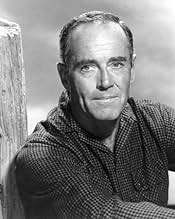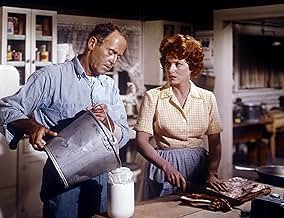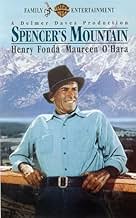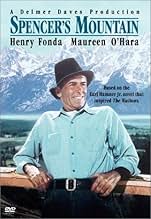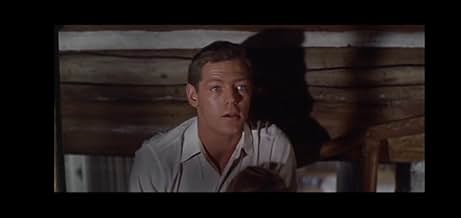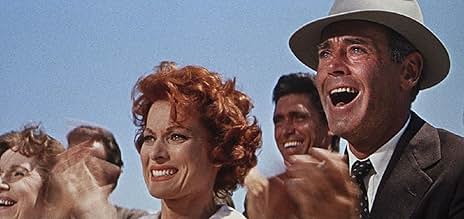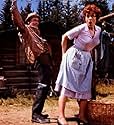NOTE IMDb
7,0/10
3,4 k
MA NOTE
Le carrier du parc de Grand Teton et le patriarche de la famille naviguent avec soin sur les questions de religion et d'éducation afin d'assurer un avenir meilleur à sa famille.Le carrier du parc de Grand Teton et le patriarche de la famille naviguent avec soin sur les questions de religion et d'éducation afin d'assurer un avenir meilleur à sa famille.Le carrier du parc de Grand Teton et le patriarche de la famille naviguent avec soin sur les questions de religion et d'éducation afin d'assurer un avenir meilleur à sa famille.
- Réalisation
- Scénario
- Casting principal
- Récompenses
- 1 nomination au total
William Breen
- Mountain Boy
- (non crédité)
Veronica Cartwright
- Becky Spencer
- (non crédité)
Michele Daves
- Donnie Spencer
- (non crédité)
Martin Eric
- Odell Harper
- (non crédité)
Avis à la une
I don't know what the other guy was talking about, but I found this movie to be great. Henry Fonda as the head of the family was jovial, but stern. Maureen O'Hara was her usual tough, but beautiful leading lady. The story was engaging, the scenery is breath-taking, and makes one yearn for those old films that made going to the movies an event, something really special. I'm also glad it's finally out on DVD, as my pan and scan VHS copy isn't the greatest. Plot-wise, it followed the life of the Spencer family and their many adventures, if you will. The plots weren't all over the place, it was just documenting the various happenings in the Spencer family. Anyone with a heart will love this movie!
Fun and wholesome story about a Wyoming landowner called Clay Spencer (Henry Fonda) , he is a hard-working man who loves his wife (Mauren O'Hara) and large family. Clay abhorring religion , though allows his wife to raise the children as Christians and keeps promising to build another family house . Spencer runs a loving and attractive family and the kids long for a permanent home . Clay is respected by his neighbors and always ready to give them a helping hand . Meanwhile , his son Clayboy wants to go at University , and the schoolteacher impresses upon Clayboy the following phrase, "The world steps aside to let a man pass, if he knows where he is going" . Problems start when the misfit kiddies join themselves as the free spirits and the undisciplined preppies, along with troubled Clayboy (James MacArthur) who falls in love with Claris Coleman (Mimsy Farmer) . There are various family crisis but it is all very heartwarming .
Henry Fonda's entertaining vehicle with young people and agreeable actors . The film deals with a happy family , the father is a notorious handy man and the mother is a brilliant housewife . Charming tale though stuck with average screenplay based on the Earl Hamner Jr novel . Henry Fonda and Mauren O'Hara ought to keep the familiar order involving in their own home while at the same time occupy the works . Nice work by filmmaker Delmer Daves in demonstrating his skill at all areas : as technical , using all kind of resources for illustrating the interesting as well as enjoyable story with an engaging screenplay , adding great actors , professional filmmaking and correct narration , including his characteristic use of landscape .The picture is pretty entertaining and amusing , the film contains bemusing scenes , zany shenanigans , continuous laughters and various chuckles with lots of fun . Humanity and humor are high in the priorities of the director Delmer Daves who shows a considerable talent recapturing funny situations . Fine settings and adequate local colour , in fact , many locals of Jackson Hole, Wyoming were used as extras for scenes in the movie , such as the graduation of Clayboy . The picture belongs to family sub-genre whose maxim representation is ¨Cheaper by dozen ¨ with Myrna Loy and Clifton Webb and a modern version starred by Steve Martin and Bonnie Hunt ; ¨Yours , mine and ours¨ also starred by Henry Fonda and Lucille Ball, being recently remade (2005) by Raja Gosnell with Dennis Quaid and Rene Russo . Formidable main cast , very well featured by Henry Fonda and Mauren O'Hara . Secondary cast is frankly good such as Virginia Gregg as Miss Parker , Whit Bissell as Dr. Campbell , Hayden Rorke as Colonel Coleman , Dub Taylor as Percy Cook , Mike Henry ¨Tarzan¨ as Spencer Brother and Victor French of "Little House on the Prairie" as Brother . And film debut of Barbara McNair and final film of Donald Crisp. Besides , there appears as sons ,some young actors who will have an acceptable career as TV or cinema stars such as Verónica Cartwright of ¨Alien¨. Director Delmer Daves' granddaughter, Michele Daves, made her only film appearance to date in this movie, appearing as the youngest Spencer child, baby Donnie . Maureen O'Hara's real-life daughter, Bronwyn FitzSimons, plays the part of the college dean's secretary. Colorful as well as evocative cinematography by Charles Lawton Jr filmed on location in Grand Teton National Park, Moose, Wyoming, Jackson Hole, Wyoming, and Raymond , California . Rousing and lively musical score by the classical composer Max Steiner .
The motion picture was well directed by Delmer Daves , though results to be excessively maudlin . His films have a special penchant for recapturing a particular atmosphere , many of this movies are about real people but they remain muted in impact . He was a notorious screenwriter , but Daves was especially a expert on Western genre , for the reason he lived a long time of his boyhood with the Navajo and Hopi Indian tribes as he realized the notorious trail-blazing ¨Broken arrow¨ the first movie for many years not treat the Indians as cannon-fodder for the cavalry , which made the picture unpopular in some quarters . He went on directing the suspenseful ¨3:10 to Yuma¨, other pro-Indian as ¨The last wagon¨ and about Modoc Indians as ¨Drum beat¨ , the Shakespearian style of ¨Jubal¨ , ¨Return of the Texan¨ and ¨Cowboy¨ which a fairly spectacle about a long cattle drive . He also realized Noir films such as ¨Dark passage¨ and ¨The red House¨ that is absolutely recommended . From 1959 Delmer Daves becomes embroiled for the remainder of his career with teenage love epics and very popular at the Box-office as ¨A summer place¨, ¨Parrish¨, ¨Susan Slade¨, and ¨Rome adventure¨, and family movies such as ¨The Spencer's mountain¨ . Worthwhile seeing .
Henry Fonda's entertaining vehicle with young people and agreeable actors . The film deals with a happy family , the father is a notorious handy man and the mother is a brilliant housewife . Charming tale though stuck with average screenplay based on the Earl Hamner Jr novel . Henry Fonda and Mauren O'Hara ought to keep the familiar order involving in their own home while at the same time occupy the works . Nice work by filmmaker Delmer Daves in demonstrating his skill at all areas : as technical , using all kind of resources for illustrating the interesting as well as enjoyable story with an engaging screenplay , adding great actors , professional filmmaking and correct narration , including his characteristic use of landscape .The picture is pretty entertaining and amusing , the film contains bemusing scenes , zany shenanigans , continuous laughters and various chuckles with lots of fun . Humanity and humor are high in the priorities of the director Delmer Daves who shows a considerable talent recapturing funny situations . Fine settings and adequate local colour , in fact , many locals of Jackson Hole, Wyoming were used as extras for scenes in the movie , such as the graduation of Clayboy . The picture belongs to family sub-genre whose maxim representation is ¨Cheaper by dozen ¨ with Myrna Loy and Clifton Webb and a modern version starred by Steve Martin and Bonnie Hunt ; ¨Yours , mine and ours¨ also starred by Henry Fonda and Lucille Ball, being recently remade (2005) by Raja Gosnell with Dennis Quaid and Rene Russo . Formidable main cast , very well featured by Henry Fonda and Mauren O'Hara . Secondary cast is frankly good such as Virginia Gregg as Miss Parker , Whit Bissell as Dr. Campbell , Hayden Rorke as Colonel Coleman , Dub Taylor as Percy Cook , Mike Henry ¨Tarzan¨ as Spencer Brother and Victor French of "Little House on the Prairie" as Brother . And film debut of Barbara McNair and final film of Donald Crisp. Besides , there appears as sons ,some young actors who will have an acceptable career as TV or cinema stars such as Verónica Cartwright of ¨Alien¨. Director Delmer Daves' granddaughter, Michele Daves, made her only film appearance to date in this movie, appearing as the youngest Spencer child, baby Donnie . Maureen O'Hara's real-life daughter, Bronwyn FitzSimons, plays the part of the college dean's secretary. Colorful as well as evocative cinematography by Charles Lawton Jr filmed on location in Grand Teton National Park, Moose, Wyoming, Jackson Hole, Wyoming, and Raymond , California . Rousing and lively musical score by the classical composer Max Steiner .
The motion picture was well directed by Delmer Daves , though results to be excessively maudlin . His films have a special penchant for recapturing a particular atmosphere , many of this movies are about real people but they remain muted in impact . He was a notorious screenwriter , but Daves was especially a expert on Western genre , for the reason he lived a long time of his boyhood with the Navajo and Hopi Indian tribes as he realized the notorious trail-blazing ¨Broken arrow¨ the first movie for many years not treat the Indians as cannon-fodder for the cavalry , which made the picture unpopular in some quarters . He went on directing the suspenseful ¨3:10 to Yuma¨, other pro-Indian as ¨The last wagon¨ and about Modoc Indians as ¨Drum beat¨ , the Shakespearian style of ¨Jubal¨ , ¨Return of the Texan¨ and ¨Cowboy¨ which a fairly spectacle about a long cattle drive . He also realized Noir films such as ¨Dark passage¨ and ¨The red House¨ that is absolutely recommended . From 1959 Delmer Daves becomes embroiled for the remainder of his career with teenage love epics and very popular at the Box-office as ¨A summer place¨, ¨Parrish¨, ¨Susan Slade¨, and ¨Rome adventure¨, and family movies such as ¨The Spencer's mountain¨ . Worthwhile seeing .
10xhancock
When I joined the IMDB community, I was asked about my favorite movie. I was at a loss for about five minutes, trying to think of movies that I could truly consider my favorite. This movie finally won over the others I considered when I realized that a favorite is something personal and beyond reproach - you may hate this movie, but I saw at the perfect time of my life and now it means much more to me than it probably could otherwise.
Henry Fonda turns in an excellent performance, which is testimony to his work ethic - he vocally denounced the script as "corny" enough to throw back Hollywood film-making 20 years. The children are troopers of the same era as other classic family movies, ala Disney's "Swiss Family Robinson." I imagine the casting companies used were the same.
This movie accomplishes what it sets out to do - make you care about the Spencer family, their desire for respect and honor, and the sacrifices they make to do what they think is right. There are many moments in this movie where you could be moved to tears.
An emotional movie with, dare I say it, a lot of heart. It is my favorite movie.
Henry Fonda turns in an excellent performance, which is testimony to his work ethic - he vocally denounced the script as "corny" enough to throw back Hollywood film-making 20 years. The children are troopers of the same era as other classic family movies, ala Disney's "Swiss Family Robinson." I imagine the casting companies used were the same.
This movie accomplishes what it sets out to do - make you care about the Spencer family, their desire for respect and honor, and the sacrifices they make to do what they think is right. There are many moments in this movie where you could be moved to tears.
An emotional movie with, dare I say it, a lot of heart. It is my favorite movie.
Adapted from the autobiographical novel by Earl Hamner, Jr., "Spencer's Mountain" is, firstly, a nostalgic look at a way of life from the viewpoint of the writer. Released in 1963, the story undoubtedly had great appeal for those who see that way of life as quintessentially "the American way".
Set in New Dominion, the name is the first clue to the outlook of the residents (and the film's producers). "Dominion" might be translated as a territory under God's authority or control. Religion is one of the subjects of the film. But life in New Dominion has a simplicity that is a central theme.
In this valley that nestles under the Grand Tetons, there are only two churches. There are also few choices of occupation, few neighbors, and few visitors. Residents are connected to the land in an elemental way--mostly through farming, quarrying or via the lumber mill. One unstated but permeating message of the film is the goodness and value associated with such a connection.
The central character is Clay Spencer (Henry Fonda), father of eight and salt of the earth. Living under sparkling blue skies, he and his wife, Olivia (Maureen O'Hara), raise their children to be kind and to have dreams. Another central theme of the film is the value of dreams. The family is dedicated to the purpose of sending the oldest child, Clayboy (James MacArthur), to college.
One of their long-term projects is a dream house set on an idyllic hillside overlooking the valley and the grandeur of the mountains.
As Clay and his family strive for their dreams and negotiate the hardships that intervene in all lives, the viewer is treated to vignettes that are dipped in Disney and Doris Day. Bountiful streams and pastures bursting with fecundity frame a Norman Rockwellian world even homier and more basic than Mayberry. The film has been accused of mawkishness and justifiably so. No chance is missed to sing a hymn, recognize a milepost of life, wave the American flag or jerk a tear from a moment.
But that is not all bad. The film does what it does very well. Henry Fonda's voice almost feels like the bedrock that supports the entire family. The rosy-cheeked cast is the perfect picture of God's grace. The end product feels very iconic and touching, no doubt extracting tears from numerous scenes. I wish the sentimentality had been dialed down a notch--like when "America" is unnecessarily played behind the toasting of Clayboy.
"Spencer's Mountain" was well-designed for audiences in 1963. Even with it's overly sentimental tone, it has a wholesomeness and a respect for values that will appeal to viewers of any era.
Later, the story would be adapted again as TV's "The Waltons".
Set in New Dominion, the name is the first clue to the outlook of the residents (and the film's producers). "Dominion" might be translated as a territory under God's authority or control. Religion is one of the subjects of the film. But life in New Dominion has a simplicity that is a central theme.
In this valley that nestles under the Grand Tetons, there are only two churches. There are also few choices of occupation, few neighbors, and few visitors. Residents are connected to the land in an elemental way--mostly through farming, quarrying or via the lumber mill. One unstated but permeating message of the film is the goodness and value associated with such a connection.
The central character is Clay Spencer (Henry Fonda), father of eight and salt of the earth. Living under sparkling blue skies, he and his wife, Olivia (Maureen O'Hara), raise their children to be kind and to have dreams. Another central theme of the film is the value of dreams. The family is dedicated to the purpose of sending the oldest child, Clayboy (James MacArthur), to college.
One of their long-term projects is a dream house set on an idyllic hillside overlooking the valley and the grandeur of the mountains.
As Clay and his family strive for their dreams and negotiate the hardships that intervene in all lives, the viewer is treated to vignettes that are dipped in Disney and Doris Day. Bountiful streams and pastures bursting with fecundity frame a Norman Rockwellian world even homier and more basic than Mayberry. The film has been accused of mawkishness and justifiably so. No chance is missed to sing a hymn, recognize a milepost of life, wave the American flag or jerk a tear from a moment.
But that is not all bad. The film does what it does very well. Henry Fonda's voice almost feels like the bedrock that supports the entire family. The rosy-cheeked cast is the perfect picture of God's grace. The end product feels very iconic and touching, no doubt extracting tears from numerous scenes. I wish the sentimentality had been dialed down a notch--like when "America" is unnecessarily played behind the toasting of Clayboy.
"Spencer's Mountain" was well-designed for audiences in 1963. Even with it's overly sentimental tone, it has a wholesomeness and a respect for values that will appeal to viewers of any era.
Later, the story would be adapted again as TV's "The Waltons".
Before The Waltons, there was Spencer's Mountain. Based on the autobiographical novel by Earl Hamner, Jr, this heartwarming family drama fathered the beloved TV series and features all its familiar ingredients-poor family with nine children struggling to make ends meet, rural setting, live-in grandparents, gifted oldest son, mother named Livvie, coming-of-age crises-the list goes on and on. Even the famous (and corny) "good night" ritual debuts here; the names may be different (there's no Mary Ellen, Jason or Jim-Bob), but the indelible long shot-darkened house with one lamp burning in an upstairs window-is framed exactly as it would be on television nine years later.
Along with the similarities, though, come some changes. Instead of Depression-era Appalachia, the Spencers confront their problems in contemporary Wyoming, affording a more dramatic backdrop and the ability to deal with modern mores. And instead of John-Boy, we have Clay-Boy (James MacArthur), the oldest son of Clay Spencer (Henry Fonda) and his wife (Maureen O'Hara). While Clay-Boy is not an aspiring writer like his TV counterpart (and flaunts a decidedly more beefy physique), he does win top honors in his high school class and harbors a potent desire to attend college and escape his sheltered mountain life. Clay-Boy's efforts to meet the university's academic and financial requirements, as well as Clay Sr.'s burning wish to build his dream house, are among the everyday issues the Spencers must face.
Maybe if The Waltons never existed, Spencer's Mountain would better stand the test of time. But so ingrained is The Waltons in our collective conscience, it's difficult to divorce Spencer's Mountain from it-and from the elements that have prompted merciless parody over the years. The folksy, homespun attitudes that permeate Delmer Daves' production alternately provoke charmed smiles and withering cringes, usually depending on who is speaking the lines. And while the film benefits from breathtaking location shooting in Grand Teton National Park, even the majestic snow-capped peaks can't dilute the sugar coating that drips from many scenes.
Unfortunately, the younger actors bear the brunt of the blame. MacArthur tries his best, but often is sabotaged by the annoying Mimsy Farmer (yes, Mimsy) as Clay-Boy's sweetheart Claris, whose hormones rage so ferociously she practically eats Clay-Boy alive during their breathy love scenes. Such frank treatment of blossoming sexuality is commendable, but seems laughably inappropriate in such a family-oriented film, at times transforming Spencer's Mountain into a watered-down version of A Summer Place (interestingly enough, also directed by Daves).
Fonda and O'Hara, on the other hand, make an ideal couple, acting with an ease and familiarity that gives their relationship a warm, comfortable feel. Fonda especially embodies the uneducated, hard-drinking, heart-of-gold Clay Sr., always willing to fight and sacrifice so his brood can enjoy a richer, more prosperous life. Without a doubt, Fonda is the soul of Spencer's Mountain, and his natural, beautifully shaded portrayal keeps the film from descending into a maudlin mess.
Despite its shortcomings, Spencer's Mountain is tough to knock. Featuring forthright, salt-of-the-earth characters, timeless family themes and lovely cinematography, it wiggles its way into the heart and, like the noble Spencers, we graciously forgive its faults.
Along with the similarities, though, come some changes. Instead of Depression-era Appalachia, the Spencers confront their problems in contemporary Wyoming, affording a more dramatic backdrop and the ability to deal with modern mores. And instead of John-Boy, we have Clay-Boy (James MacArthur), the oldest son of Clay Spencer (Henry Fonda) and his wife (Maureen O'Hara). While Clay-Boy is not an aspiring writer like his TV counterpart (and flaunts a decidedly more beefy physique), he does win top honors in his high school class and harbors a potent desire to attend college and escape his sheltered mountain life. Clay-Boy's efforts to meet the university's academic and financial requirements, as well as Clay Sr.'s burning wish to build his dream house, are among the everyday issues the Spencers must face.
Maybe if The Waltons never existed, Spencer's Mountain would better stand the test of time. But so ingrained is The Waltons in our collective conscience, it's difficult to divorce Spencer's Mountain from it-and from the elements that have prompted merciless parody over the years. The folksy, homespun attitudes that permeate Delmer Daves' production alternately provoke charmed smiles and withering cringes, usually depending on who is speaking the lines. And while the film benefits from breathtaking location shooting in Grand Teton National Park, even the majestic snow-capped peaks can't dilute the sugar coating that drips from many scenes.
Unfortunately, the younger actors bear the brunt of the blame. MacArthur tries his best, but often is sabotaged by the annoying Mimsy Farmer (yes, Mimsy) as Clay-Boy's sweetheart Claris, whose hormones rage so ferociously she practically eats Clay-Boy alive during their breathy love scenes. Such frank treatment of blossoming sexuality is commendable, but seems laughably inappropriate in such a family-oriented film, at times transforming Spencer's Mountain into a watered-down version of A Summer Place (interestingly enough, also directed by Daves).
Fonda and O'Hara, on the other hand, make an ideal couple, acting with an ease and familiarity that gives their relationship a warm, comfortable feel. Fonda especially embodies the uneducated, hard-drinking, heart-of-gold Clay Sr., always willing to fight and sacrifice so his brood can enjoy a richer, more prosperous life. Without a doubt, Fonda is the soul of Spencer's Mountain, and his natural, beautifully shaded portrayal keeps the film from descending into a maudlin mess.
Despite its shortcomings, Spencer's Mountain is tough to knock. Featuring forthright, salt-of-the-earth characters, timeless family themes and lovely cinematography, it wiggles its way into the heart and, like the noble Spencers, we graciously forgive its faults.
Le saviez-vous
- AnecdotesIn their book "How Underdog Was Born...", W. Watts Biggers and Chad Strover reveal that seeing Wally Cox's performance in this movie inspired them to ask him to voice their newly created character, Underdog.
- GaffesInfo on the film lists Wally Cox's character as Reverend "Goodman", but he calls himself Goodson, as does the rest of the cast.
- Citations
Miss Parker: The world steps aside to let any man pass if he knows where he is going.
- ConnexionsFeatured in AFI Life Achievement Award: A Tribute to Henry Fonda (1978)
- Bandes originalesAmerica the Beautiful
(uncredited)
Words by Katharine Lee Bates 1904
Music by Samuel A. Ward, 1882
Sung by Barbara McNair
Meilleurs choix
Connectez-vous pour évaluer et suivre la liste de favoris afin de recevoir des recommandations personnalisées
- How long is Spencer's Mountain?Alimenté par Alexa
Détails
- Durée
- 1h 58min(118 min)
- Mixage
- Rapport de forme
- 2.35 : 1
Contribuer à cette page
Suggérer une modification ou ajouter du contenu manquant


